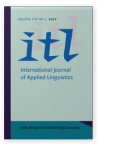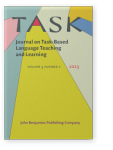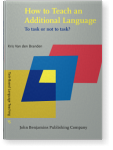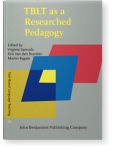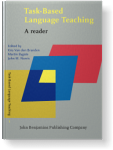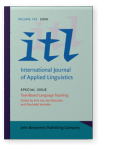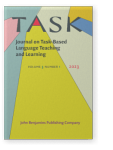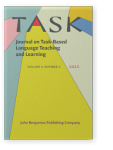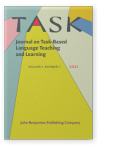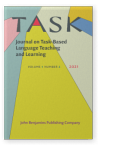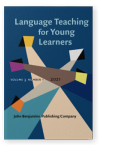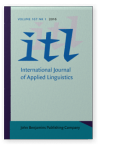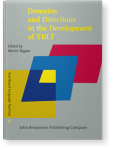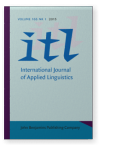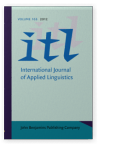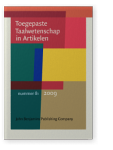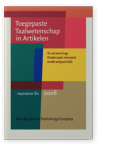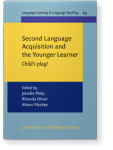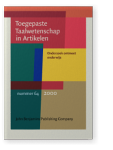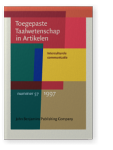Kris Van den Branden
List of John Benjamins publications for which Kris Van den Branden plays a role.
Journals
Titles
How to Teach an Additional Language: To task or not to task?
Kris Van den Branden
[Task-Based Language Teaching, 15] 2022. xiii, 292 pp.
Subjects Applied linguistics | Language acquisition | Language teaching | Multilingualism
TBLT as a Researched Pedagogy
Edited by Virginia Samuda, Kris Van den Branden and Martin Bygate
[Task-Based Language Teaching, 12] 2018. viii, 292 pp.
Subjects Applied linguistics | Language acquisition | Language teaching
Task-Based Language Teaching: A reader
Edited by Kris Van den Branden, Martin Bygate and John M. Norris
[Task-Based Language Teaching, 1] 2009. ix, 512 pp.
Subjects Applied linguistics | Language acquisition | Language teaching
Task-Based Language Teaching
Edited by Kris Van den Branden and Machteld Verhelst
Special issue of ITL - International Journal of Applied Linguistics 152 (2006) ca. 160 pp.
Subjects Applied linguistics | Language acquisition | Language policy | Language teaching | Multilingualism
Articles
2023 The acquisition of L2 Hungariangrammar rules and the implicit-explicit debate ITL - International Journal of Applied Linguistics 174:2, pp. 202–229 | Article
This study contributes to the explicit implicit debate by investigating to which extent adult learners of Hungarian develop knowledge of new grammar rules, and the proficiency to use them, through listening activities complemented with explicit grammar instruction or not. In a… read more
2023 Spreading the word: An interview with Jane Willis TASK 3:1, pp. 178–190 | Discussion
Jane Willis worked overseas as an English teacher and teacher trainer for many years, during which time she began using the Birmingham University International Language Database to design a series of course books based on a lexical syllabus and using a TBLT methodology. Then, back in the UK, she… read more
2022 TBLT in context: An interview with Rod Ellis TASK 2:2, pp. 269–285 | Miscellaneous
2021 Unlocking the power of productive classroom talk for early second language acquisition: A study into the effects of a task-based intervention TASK 1:1, pp. 71–99 | Article
This study investigates whether participation in classroom interaction and a specific type of affective priming using parents’ pictures had positive effects on ethnic minority children’s L2 vocabulary acquisition. A quasi-experimental study was set up in which preschoolers-at-risk were engaged… read more
2021 Engineering TBLT: An interview with Marta González-Lloret in memory of Mike Long TASK 1:2, pp. 184–195 | Interview
2021 Introducing TASK: Editors’ preface to the first edition of TASK TASK 1:1, pp. 1–10 | Introduction
2021 Implementing task-based language education in primary education: Lessons learnt from the Flemish experience Language Teaching for Young Learners 3:1, pp. 3–27 | Article
This article provides a critical analysis of the language policy measures that were taken by the Flemish government (Belgium) to improve the quality of the teaching of the national language (Dutch) in compulsory education in Flanders and in the Flemish education system in Brussels. It builds on… read more
2018 Introduction: Towards a researched pedagogy for TBLT TBLT as a Researched Pedagogy, Samuda, Virginia, Kris Van den Branden and Martin Bygate (eds.), pp. 1–22 | Miscellaneous
2018 Chapter 6. Task-based language teaching: How task-based is it really? TBLT as a Researched Pedagogy, Samuda, Virginia, Kris Van den Branden and Martin Bygate (eds.), pp. 165–198 | Chapter
The purpose of the study described in this chapter was to explore the classroom practices of teachers with varying degrees of experience in task-based language teaching (TBLT) while using a task-based syllabus. In particular, we wanted to assess the extent to which their actual classroom practices… read more
2016 Editors’ preface ITL - International Journal of Applied Linguistics 167:1, pp. 1–2 | Article
2015 Task-based language education: From theory to practice … and back again Domains and Directions in the Development of TBLT: A decade of plenaries from the international conference, Bygate, Martin (ed.), pp. 303–320 | Article
Task-based language teaching has been claimed to promote language acquisition by inviting learners to use language for meaningful purposes and focus on form while doing so. In this article, a range of classroom observation studies conducted in Flanders (Belgium) are reported, vividly illustrating… read more
2015 The impact of PPP and TBLT on Vietnamese students’ writing performance and self-regulatory writing strategies ITL - International Journal of Applied Linguistics 166:1, pp. 37–93 | Article
While the available research literature appears to support the implementation of task-based language teaching (TBLT) in Western countries, few studies have been conducted to investigate its impact on classroom practice in Asia, especially in comparison with the presentation-practice-production… read more
2012 The Impact Of Input On Early Second Language Vocabulary Acquisition ITL - International Journal of Applied Linguistics 163, pp. 21–42 | Article
This study investigated the effect of two meaning-oriented communicative tasks on L2 learners’ consolidation of new vocabulary met in a reading text on a familiar topic, building on the premises underlying the Dreyfus and Tsamir (2004) ‘Recognising, Building-with, and Constructing’ (RBC) model.… read more
2009 Coda: Understanding TBLT at the interface between research and pedagogy Task-Based Language Teaching: A reader, Van den Branden, Kris, Martin Bygate and John M. Norris (eds.), pp. 495–499 | Miscellaneous
2009 Section intro Task-Based Language Teaching: A reader, Van den Branden, Kris, Martin Bygate and John M. Norris (eds.), pp. 431–434 | Miscellaneous
2009 Section intro Task-Based Language Teaching: A reader, Van den Branden, Kris, Martin Bygate and John M. Norris (eds.), pp. 243–247 | Miscellaneous
2009 Section intro Task-Based Language Teaching: A reader, Van den Branden, Kris, Martin Bygate and John M. Norris (eds.), pp. 131–134 | Miscellaneous
2009 Section intro Task-Based Language Teaching: A reader, Van den Branden, Kris, Martin Bygate and John M. Norris (eds.), pp. 15–19 | Miscellaneous
2009 Welke Leerlingen Leren het Meest Bij Over DNA? Effecten van een Interventie Rond Kennisconstructie en Schooltaal bij Anderstalige Leerlingen in Groep 8 van Vijf Zwarte Basisscholen Toegepaste Taalwetenschap in Artikelen 81, pp. 109–119 | Article
Educational priority policy schools differ in the learning outcomes they achieve with second language learners. School effectiveness research suggests that teachers can make a difference, but fails to make clear exactly how they can do so. This quasi-experimental study combines a comparison group… read more
2009 Chapter 18. Training teachers: Task-based as well? Task-Based Language Teaching: A reader, Van den Branden, Kris, Martin Bygate and John M. Norris (eds.), pp. 401–430 | Article
2009 Chapter 1. Task-based language teaching: introducing the reader. Task-Based Language Teaching: A reader, Van den Branden, Kris, Martin Bygate and John M. Norris (eds.), pp. 1–13 | Article
2008 Exploring The Complexity Of Classroom Tasks For Language Learning T2-verwerving: Onderzoek ontmoet onderwijsparktijk, pp. 42–47 | Article
In task-based language teaching (TBLT), defining and manipulating the complexity of language tasks has been claimed to be of crucial importance, in view of sequencing tasks in a task-based syllabus, manipulating tasks to meet specific learners' needs, and assessing language learners' current level… read more
2008 Negotiation of meaning in the classroom: Does it enhance reading comprehension? Second Language Acquisition and the Younger Learner: Child's play?, Philp, Jenefer, Rhonda Oliver and Alison Mackey (eds.), pp. 149–169 | Article
This study focuses on young children’s negotiation behaviour in the classroom. Through negotiating for meaning, children may unravel the meaning of difficult input or be pushed to produce more adequate and correct output. Previous research has shown that young children, while reading for… read more
2006 Book review Task-Based Language Teaching, Van den Branden, Kris and Machteld Verhelst (eds.), pp. 151–152 | Review
2006 Preface: Task-Based Language Teaching: Forms and Functions Task-Based Language Teaching, Van den Branden, Kris and Machteld Verhelst (eds.), pp. 1–6 | Article
2000 NIT of NTL? Over de Rol van Taal in het Voortgezet Onderwijs Onderzoek ontmoet onderwijs, pp. 25–35 | Article
In Flemish secondary schools, non-indigenous pupils underachieve. This is pardy due to the way teachers use Dutch as a medium of instruction. In the past, various pedagogical solutions have been put forward to address this problem. However, none of these appears to be successful, basically because… read more
1997 Zijn er Nog Problemen? Betekenisonderhandeling in de Multiculturele Taalklas Interculturele communicatie, pp. 19–32 | Article
Negotiation of meaning is thought to promote language acquisition in various ways. Paradoxically, both the quantity and quality of negotiation of meaning in the multicultural classroom has been shown to be poor. Particularly non-indigenous pupils with a lower level of language proficiency receive… read more
